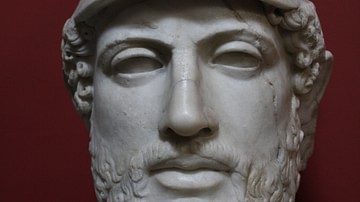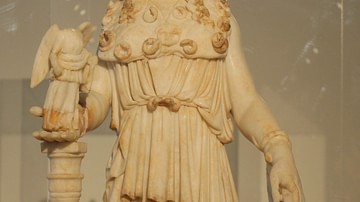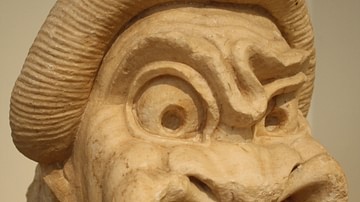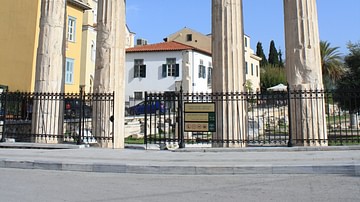Search
Remove Ads
Advertisement
Summary 
Loading AI-generated summary based on World History Encyclopedia articles ...
Search Results

Definition
Pericles
Pericles (l. 495–429 BCE) was a prominent Greek statesman, orator, and general during the Golden Age of Athens. The period in which he led Athens, in fact, has been called the Age of Pericles due to his influence, not only on his city's fortunes...

Article
Pericles & the Restoration of the Athenian Agora
The agora of Athens developed from the 6th century BCE until it was destroyed in the Persian invasion of 480 BCE. Afterwards, the statesman Pericles (l. 495-429 BCE) used funds from the Delian League to restore it as the physical manifestation...

Definition
Aspasia of Miletus
Aspasia of Miletus (l. c. 470-410/400 BCE) is best known as the consort of the great Athenian statesman Pericles. Her life story has always been given in the shadow of Pericles' fame, but she was a woman of great eloquence and intelligence...

Definition
Phidias
Phidias (also Pheidias) was, according to his contemporaries, the most renowned of all Greek sculptors. His greatest masterpieces were completed between c. 465 and 425 BCE. Unfortunately, except through copies, no example of his work has...

Image
Ostrakon for Pericles
Pottery ostrakon identifying Pericles, 444-443 BCE. These were used in Athens to vote a particular citizen to be exiled from the polis. From a well on the north slope of the acropolis of Athens. (Museum of the Ancient Agora, Athens)

Image
Pericles
A 1st century CE bust of the Athenian statesman Pericles probably from a 5th century BCE original bronze. Provenance: Rome. (Vatican Museums, Rome).

Article
The Plays of Cratinus
Cratinus was a highly successful writer of Attic Old Comedy, but the very fragmentary nature of his surviving plays means that he is not as well remembered as Aristophanes (eleven of whose plays come down to us intact). Despite this, it is...

Article
Hellenistic & Roman Agora of Athens
Pericles’ agora of Athens flourished under Macedonian control. After Macedon was defeated by Rome, the Romans added to the district even before Greece was taken as a province and more so afterwards. The Roman version of the agora continued...

Article
The Delian League, Part 2: From Eurymedon to the Thirty Years Peace (465/4-445/4 BCE)
This text is part of an article series on the Delian League. The second phase of the Delian League's operations begins with the Hellenic victory over Mede forces at Eurymedon and ends with the Thirty Years Peace between Athens and Sparta...

Definition
Bronze Age Aegean
The Bronze Age (c. 3000-1000 BCE) is the period when cultures were either using, producing, or trading bronze. Several cultures flourished around the Aegean Sea during this period: the Minoan civilization on Crete, the Mycenaean civilization...